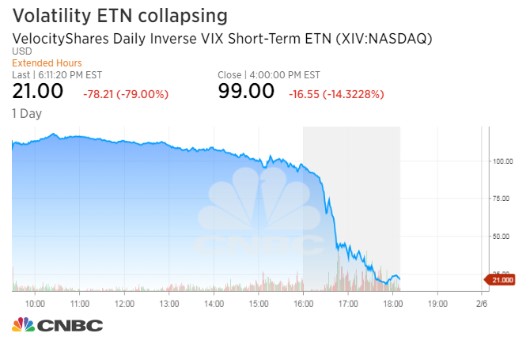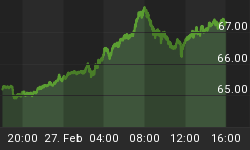Wall Street banks are big, rich and powerful. They are also a pretty scandalous and profligate lot that seems to thrive on greed as if their very own survival depended on it. No longer content to be the conservative custodians of other people’s money, they have contrived a wide range of fiendish and sometimes quasi-legal instruments to help them squeeze an extra dollar from hapless markets.
Their armies of Brioni suit-clad lawyers are mostly able to keep them out of trouble. Case in point: to-date, nobody has yet been indicted for the huge February market crash though it was pinned on exotic trading instruments by a certain prominent bank.

(Click to enlarge)
Source: CNBC
But sometimes their legal chicanery fails, and their luck runs out. These mega-banks have been found guilty and fined heavily by the Commodity Futures Trading Commission (CFTC) for rigging a popular currency swap benchmark.
A group of Investors led by municipalities and pension funds have just reached a $96 million settlement with the final five banks in private litigation that accused a total of 14 US banks of rigging ISDAFIX. That brings the total payout (including an $11.5 million fine for ICAP Capital Markets LLC) to $504.5 million--a record for the crime.
Banging the Close
Launched in 1998, ISDAFIX (U.S. Dollar International Swaps and Derivatives Association Fix) is a key interest rate benchmark that’s commonly used in the global derivatives market. Companies and investors use the benchmark to price swap transactions, structured debt securities and commercial real estate mortgages. Related: EU Joins The Trade War With New Tariffs On U.S. Goods
One key benefit provided by the benchmark is that it allows traders to agree on pricing of interest rate swaps before expiry without having to call active dealers for quotes. Dealers use ISDAFIX to mark their swap portfolios to market. Interest rate swaps are derivatives that help traders manage potential exposure to risk by allowing two parties to exchange two streams of interest payments over a period of time.
ISDAFIX currently provides rates for the U.S. dollar, euro, sterling, Japanese yen, Hong Kong dollar and Swiss franc. The rates are based on submissions from 16 banks that are presented each day before 11am ET. The swap rate for the day is calculated by eliminating the four highest and four lowest quotes and averaging the remaining eight middling quotes.
The banks have been found guilty by the CFTC of gaming the ISDAFIX system for their own gain.
From 2009 to 2012, the banks executed a series of rapid trades just before swap rates were set each day, also known in banking parlance as “banging the close,’’ and also causing ICAP, a British brokerage that oversees U.S. dollar ISDAFIX, to delay trades until they got their desires rates. In March, U.S. District Judge Jesse Furman rejected an appeal by the 14 banks to throw out the private lawsuit, terming their behavior anticompetitive and of the kind that anticompetitive, antitrust laws were intended to deter.
Related: Chip Stocks Down But Are They Still A Good Buy?
Unlike stock market rigging, ISDAFIX scams are fairly recent, with Barclay’s 2015 fine of $115 million by the CFTC being the first of its kind.
The biggest fine on record is the $120 million that CFTC ordered Goldman Sachs to pay in 2016, making the $65 million that JP Morgan has been ordered to pay in the latest scandal appear tame in comparison.
The three giant banks are also repeat offenders so maybe judges will consider upping the ante to discourage sticky fingers.
By Alex Kimani for Safehaven.com
More Top Reads From Safehaven.com:
















